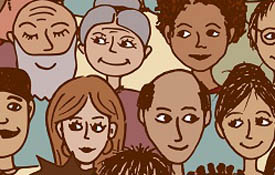-
Teaching Current Directions in Psychological Science
“Why Word Frequency Matters” by C. Nathan DeWall and “Variations in Face Recognition Ability: Stable, Specific, and Substantial” by Gil Einstein and Cindi May.
-

Do Broader Faces Signal Antisocial Traits? Maybe Not
Data from over 135,000 people show no link between broad faces and antisocial traits, in contrast with previous studies.
-
Making the Most of University Museums
Tufts University psychological scientist Heather L. Urry has found a way to incorporate the school’s art gallery into an undergraduate course on coding facial movements – illustrating how museums are teaming with psychology faculty for collaborative instruction.
-
Scientists Share How Faces Guide and Reflect Our Lives
A special issue of Current Directions in Psychological Science brings together innovative research and theory in psychological science, computer science, neuroscience, and related fields, illuminating the myriad ways in which face perception infuses how we
-

A Change of Face: New Approaches to Measuring Face Recognition and Identification
A change in hairstyle, lighting, or even facial expression may alter a person’s appearance so drastically that they look like someone else. Scientists are now developing face-recognition measures that account for these variations..
-
Uncovering the Secrets of a Trustworthy Face
Scientific American: We tend to trust the people around us. We trust cab drivers and doctors with our lives, we trust chefs handling our food, and we trust strangers to watch our belongings while we

